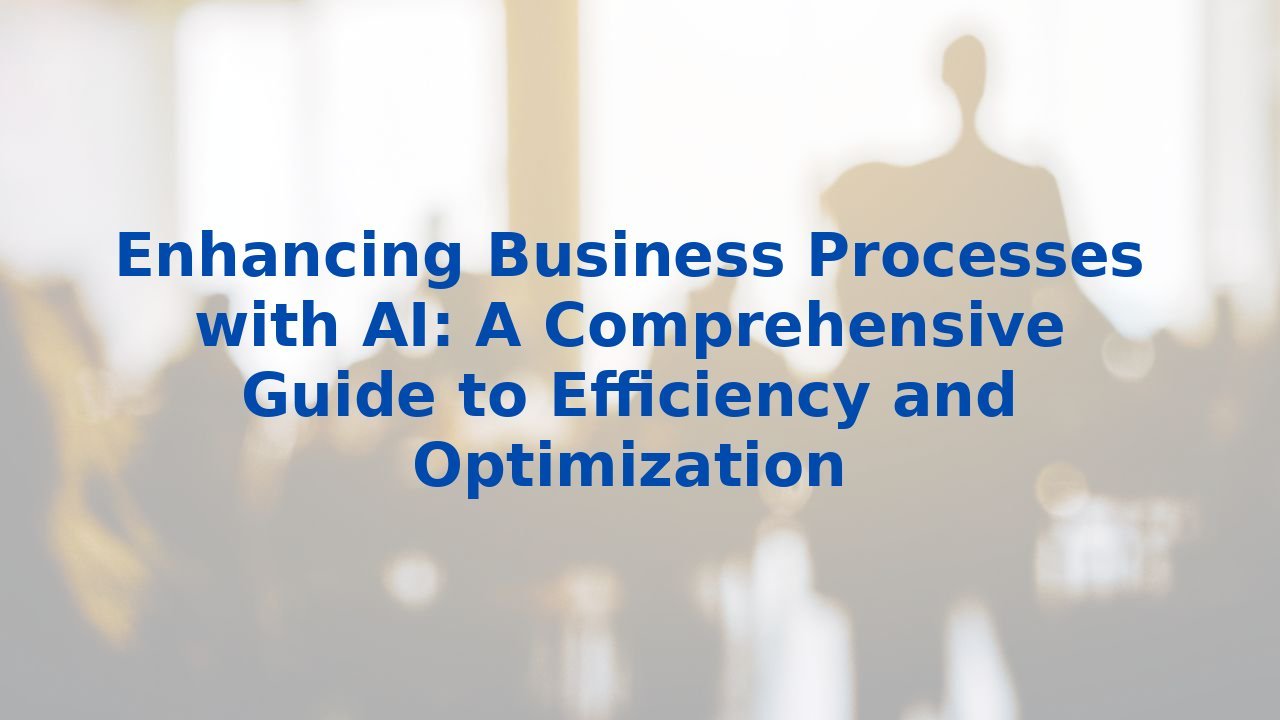Enhancing Business Processes with AI: A Comprehensive Guide to Efficiency and Optimization
Enhancing Business Processes with AI: A Comprehensive Guide to Efficiency and Optimization
Introduction
In the relentless pursuit of operational excellence, businesses today find themselves at a crossroads where traditional methods meet groundbreaking technology. Among these advancements, Artificial Intelligence (AI) stands out as a catalyst for transformation in Business Process Management (BPM). This guide unpacks the various ways AI can enhance crucial business processes, ranging from discovery to ongoing improvement, shedding light on the multitude of benefits on offer. Additionally, we'll underscore the significance of empowering your workforce through effective training, maximizing these technological marvels.
Process Discovery: Unveiling Hidden Efficiencies
Process discovery is more than just a buzzword; it’s the cornerstone of understanding how your business operates. Utilizing AI-driven techniques such as process mining and pattern recognition, organizations can uncover existing processes with remarkable speed and accuracy. Traditional methods often rely on subjective employee input and manual analysis, but AI allows companies to sift through extensive operational data, revealing underlying patterns and connections that may otherwise go unnoticed.
Process Mapping: Creating a Blueprint for Success
Once processes are unearthed, the next pivotal step is process mapping. AI can translate the discoveries into a coherent and actionable blueprint. By leveraging machine learning algorithms and data analytics, organizations can visualize workflows, pinpoint bottlenecks, and understand how various processes intertwine. This ensures that process documentation remains current and accurate, allowing businesses to adapt swiftly to shifting market demands.
Process Automation: Streamlining Operations
Perhaps one of the most revolutionary aspects of AI is its power to automate. AI-driven automation enables businesses to delegate repetitive, time-consuming tasks to intelligent bots. This not only accelerates operational speed but also liberates human resources, allowing employees to focus on more strategic functions that drive the company forward. The result? Enhanced productivity, reduced operational costs, and fewer errors, setting the stage for a more efficient workplace.
Process Management: Continuous Monitoring and Improvement
The journey doesn't end with automation. AI plays a critical role in the ongoing management of processes. Through advanced monitoring tools, organizations can keep a close eye on key performance indicators (KPIs) and receive real-time alerts about potential deviations from established processes. This proactive approach ensures that any emerging issues are promptly addressed, paving the way for a culture of continuous improvement.
Process Improvement: Data-Driven Insights
As businesses collect data over time, AI shines by providing invaluable insights that inform process improvement. AI algorithms excel in predictive modeling and root cause analysis, guiding businesses towards sustainable enhancements. By analyzing both historical and real-time data, AI identifies optimization opportunities and offers actionable recommendations, leading to increased efficiency and profitability.
Benefits of AI in BPM
Integrating AI into business processes yields a wealth of benefits that organizations cannot afford to overlook:
- Improved Efficiency: Automation of routine tasks significantly reduces the time and effort expended on manual processes.
- Enhanced Decision-Making: AI provides data-driven insights that empower leaders to make informed choices.
- Increased Accuracy: By minimizing human intervention, AI reduces errors, ensuring higher quality outcomes.
- Real-Time Monitoring: Continuous oversight enables organizations to act swiftly and decisively when issues arise.
The Importance of Employee Training
While the benefits of AI are clear, the real challenge lies in ensuring that your workforce is equipped to harness its power effectively. Here are key reasons why investing in employee training is non-negotiable:
- Understanding AI Capabilities: To integrate AI into their workflows meaningfully, employees must grasp both its potential and limitations.
- Adapting to New Tools: Well-structured training programs facilitate a smoother transition to new systems, minimizing disruptions and enhancing productivity.
- Maximizing Benefits: Knowledgeable employees can fully leverage AI tools, unlocking their potential for improved efficiency and effectiveness.
Conclusion
The evolution of BPM through AI is not just a trend; it represents a paradigm shift in how businesses operate. From process discovery to ongoing improvement, AI unlocks unprecedented efficiencies that can propel organizations toward greatness. However, these benefits are only fully realized when businesses prioritize training their employees to leverage AI technologies effectively. As organizations embrace this evolution, they are opening doors to a future filled with optimization, innovation, and success. For those ready to dive deeper into AI training solutions, a world of opportunity awaits.



